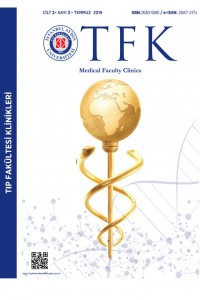Öz
Belli bir habitattaki mikroorganizmalar ile birlikte, mikroorganizmaların genomlarını ve genom ürünlerini inceleyen bilim dalı olarak adlandırılan Mikrobiyom, Metagenomik yaklaşımların ortaya çıkışıyla kapsamlı olarak incelenebilir hale gelmiştir. Mikrobiyom çalışma çıktılarının kişisel tıptaki potansiyel uygulamalarından biri olarak, tedavi ya da korunma amaçlı mikrobiyom manüpülasyonunda probiyotikler önemli yer tutmaktadır. Günümüzde probiyotikler tek başına ya da gıda takviyesi şeklinde hekim önerisiyle ve/veya kişisel tercih olarak yaygın bir şekilde kullanılmaktadır. Fakat, son zamanlarda yapılan farklı bilimsel çalışmalar ile probiyotik kullanımının faydaları kadar, etkisiz olduğu hatta zararlı olabileceği yönünde raporlar yayımlanmıştır. Probiyotik kullanımı ile ilgili çelişki verilerin varlığı, mikrobiyom modülasyonunda kişinin ihtiyacına cevap verecek suşların kullanılması ve uygulama öncesi/sonrası mümkün olduğu kadar söz konusu suşların tutunması bakımından mikrobiyom içeriğinin test edilmesi gerekliliğinin elzem olduğu ön görülmektedir.
Anahtar Kelimeler
Kaynakça
- 1. Marchesi JR, Ravel J. The vocabulary of microbiome research: a proposal. Microbiome 2015;3:31.
- 2. Woyke T, Doud DFR, Eloe-Fadrosh EA. Genomes from uncultivated microorganisims. Encyclopedia of Microbiology 2019;4e.
- 3. Tringe SG, von Mering C, Kobayashi A, et al. Comparative metagenomics of microbial communities. Science 2005;308:554-557.
- 4. Zhang J, Chiodini R, Badr A, Zhang G. The impact of nextgeneration sequencing on genomics. J Genet and Genomics 2011;38:95-109.
- 5. Ferrer M, Beloqui A, Timmis KN, Golyshin PN. Metagenomics for mining new genetic resources of microbial communities. J Mol Microbiol Biotechnol 2009;16:109-123.
- 6. Gilbert JA, Blaser MJ, Caposaro JG, et al. Current understanding of the human microbiome. Nat Med 2018;24:392-400.
- 7. Turnbaugh PJ, Ley RE, Hamady M, et al. The human microbiome project. Nature 2007;449(7164):804.
- 8. Schmidt TSB, Raes J, Bork P. The human gut microbiome: from association to modulation. Cell 2018;172(6):1198-1215.
- 9. Breznak JA, Brune A. Role of microorganisms in the digestion of lignocellulose by termites. Annu Rev Entomol 1994;39:453-487.
- 10. Cryan JF, Dinan TG. Mind-altering microorganisms: the impact of the gut microbiota on brain and behaviour. Nat Rev Neurosci 2012:13;701-712.
- 11. Buffe CG, Jarchum I, Equinda M, et al. Profound alterations of intestinal microbiota following a single dose of clindamycin results in sustained susceptibility to Clostridium diffcileinduced colitis. Infect Immun 2012:80;62-73.
- 12. Stefka AT, Feehley T, Tripathi P, et al. Commensal bacteria protect against food allergen sensitization. Proc Nat Acad Sci USA 2014:111;13145-13150.
- 13. Wang J, Jia H. Metagenome-wide association studies: fine-mining the microbiome. Nat Rev Microbiol 2016:14(8);508.
- 14. Cekanaviciute E, Yoo BB, Runia TF, et al. Gut bacteria from multiple sclerosis patients modulate human T cells and exacerbate symptoms in mouse models. Proc Natl Acad Sci USA 2017:114(40);10713-10718.
- 15. Yu T, Guo F, Yu Y, et al.Fusobacterium nucleatum promotes chemoresistance to colorectal cancer by modulating autophagy. Cell 2017:170(3);548-563.
- 16. Walter J, Maldonado-Gomez MX, Martinez I. To engraft or not to engraft: an ecological framework fro gut microbiome modulation with live microbes. Curr Opin Biotechnol 2018:49:129-139.
- 17. Lukens JR, Gurung P, Vogel P, et al. Dietary modulation of the microbiome affcts autoinflmmatory disease. Nature 2014:516;246- 249.
- 18. Langdon A, Crook N, Dantas G. The effcts of antibiotics on the microbiome throughout development and alternative approaches for therapeutic modulation. BMC Genome Medicine 2016;8:39.
- 19. Walker AW, Ince J, Duncan SH, et al. Dominant and diet-responsive groups of bacteria within the human colonic microbiota. ISME 2011:5(2);220-30.
- 20. De Filippo C, Cavalieri D, Di Paola M, et al. Impact of diet in shaping gut microbiotarevealed by a comparative study in children from Europe andrural Africa. Proc Natl Acad Sci USA, 2010:107(33):14691-6.
- 21. O’Toole P, Marches JR, Hill C. Next-generation probiotics: the spectrum from probiotics to live biotherapeutics. Nat Microbiol 2017:2;17057.
- 22. Tannock G, Munro K, Harmsen H, et al. Analysis of the fecal microf ora of human subjects consuming a probiotic product containing Lactobacillus rhamnosus DR20. Appl Environ Microbiol 2000;66(6):2578-88.
- 23. Goldenberg JZ, Yap C, Lytvyn L. et al. Probiotics for the prevention of Clostridium diffcile‐associated diarrhea in adults and children. Cochrane Database of Systematic Reviews2017:12(5); CD006095.
- 24. Doron S, Snydman DR. Risk and safety of Probiotics. Clin Infect Diseas 2015:60(2);129-134.
- 25. Elshaghabee FMF, Rokana N, Panwar H, et al. Probiotics as a dietary intervention for reducing the risk of nonalcoholic fatty liver disease. In Arora D, Sharma C, Jaglan S, Lichtfouse E. (ed) Pharmaceuticals from Microbes. Environmental Chemistry for a Sustainable World, vol 28. Springer, Cham.
- 26. Suez J, Zmora N, Zilberman-Schapira G, et al. Post-Antibiotic gut mucosal microbiome reconstitution is impaired by probiotics and improved by autologous FMT. Cell 2018:174(6);1406-1423.
- 27. Zmora N, Zilberman-Schapira G, Suez J, et al. Personalized gut mucosal colonization resistance to empiric probiotics is associated with unique host and microbiome features. Cell 2018:174(6);1388 -1405.
- 28. Mehta RS, Abu-Ali,GS, Drew DA, et al. Stability of the human faecal microbiome in a cohort of adult men. Nature microbiology 2018; 3(3):347.
Ayrıntılar
| Birincil Dil | Türkçe |
|---|---|
| Bölüm | Derleme |
| Yazarlar | |
| Yayımlanma Tarihi | 9 Ağustos 2019 |
| Kabul Tarihi | 29 Haziran 2019 |
| Yayımlandığı Sayı | Yıl 2019 Cilt: 2 Sayı: 3 |
All site content, except where otherwise noted, is licensed under a Creative Common Attribution Licence. (CC-BY-NC 4.0)


